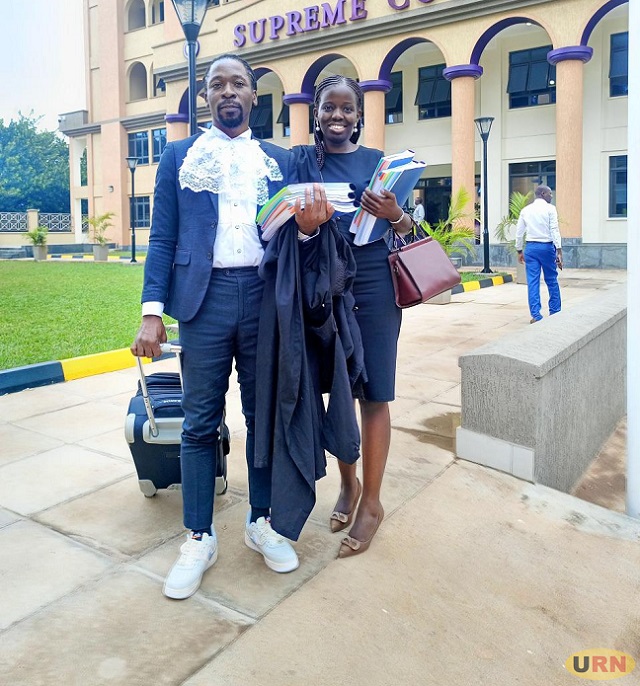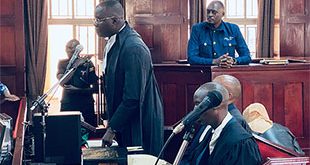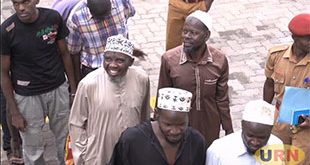
Kampala, Uganda | THE INDEPENDENT | The Supreme Court in Kampala will next week rule on an application in which Legal Brains Trust is seeking amendments to its case against businessman, Hassan Basjjabalaba.
The case is about the controversial 142 billion shillings given to Basajjabalaba as compensation from the government for having lost the tenders to manage markets in the then Kampala city council.
Legal Brains Trust, a non-profit organization, through Isaac Ssemakadde, dragged Basajjabalaba, his 5 companies, and 13 others to constitutional court seeking that they refund of the money.
He said Basajjabalaba used government officials, the Bank of Uganda, and four Commercial banks to facilitate the “theft” of 142 billion shillings from the consolidated fund.
The appeals from the two parties came up Friday as the Supreme Court conducted a session hearing for constitutional appeals. The Ssemakadde-Basajjabalaba matter was presided over by a panel of seven Justices led by Chief Justice Alfonse Owiny-Dollo.
Ssemakadde while appearing before the justices applied to make changes in his cross-appeal to enable proper determination of his matter as well as Basajjabalaba and his companies.
In its application, Ssemakadde said Legal Brains Trust is seeking to replace the late Professor Mutebile Tumusiime the former Governor Bank of Uganda who was the tenth respondent in the matter.
He said at the time, he had personally sued the late Emmanuel Tumusiime Mutebile. In the amendment, he wants to replace Mutebile with the administrators of his estate
He further stated that some of the banks he sued have since changed names. He cited the Orient Bank, which has since changed names.
Ssemakadde also sought permission to introduce two additional grounds to the application. Among those, include the need for an order that the Constitutional Court decision be reversed to precisely encompass a crucial dispute for constitutional interpretation.
The interpretation should be concerning Nakawa Market and the Central Bank letters of comfort. He avers that the majority of the Justices of the Constitutional Court failed to examine the matter before them to its logical conclusion.
He said the Banks knowingly solicited and received from the Bank of Uganda and its then Governor Mutebile an unauthorized grant out of the consolidated fund and other public funds or public accounts of Uganda, without the prior approval of Parliament.
Ssemakadde noted that each financial institution has since unlawfully refused to reverse, refund, return, or pay back to the Attorney General (government) or deposit in court which he said is therefore holding onto ill-gotten gains in its coffers.
Besides the application, Ssemakadde argues in his cross-appeal that the learned majority Justices of the Constitutional Court erred in law and fact when they failed to determine all the issues that required resolution.
He faults the lower court Justices for erring in law and fact in not finding the guarantees or letters of comfort issued by the Bank of Uganda, Former Finance Minister Syda Bumba, and the then Attorney General Professor Khiddu Makubuya.
“The learned majority Justices of the Constitutional Court erred in law and fact when they failed to provide effective remedies in the circumstances of the case before them,” he said.
Lawyers representing Basajjabalaba’s companies and others argued that the case against Mutebile abated since he died and that the application has been overtaken by events. They argued that the office of the Governor Bank of Uganda is not personal. Therefore should not and the application feels to extend it to his estate. or.
The court heard that the intended amendment was prejudicial to the Banks and the rest of the cross respondents.
The lawyers representing the respondents included; Mwesigwa Rukutana, Caleb Alaka, Joseph Kyazze, Kenneth Paul Kakande, Edgar Ayebazibwe, Albert Byamugisha, Eric Mugabula, Joseph Matsiko, and Barbara Musimenta Denis Wamala, Rushongoza Begumya, Andrew Kibaya, Mark Rutaya and Senior State Attorney Imelda Adong who has represented the Attorney General.
They told the court that Ssemakadde in his submissions abandoned some of the grounds and yet was introducing new ones long after the pleadings were closed in 2022.
After listening to all submissions, Chief Justice Owiny-Dollo promised to inform the parties as to when they will decide on this issue before hearing the main appeal.
Background of the appeal
The matter arose between October 2010 and April 2011 when Basajjabalaba and his five companies using guarantees issued by the Central bank obtained USD 65 million (Shs 238 billion) from the said commercial banks but failed to pay back the loan.
Basajjabalaba was guaranteed the loans in question on allegations that he demanded government money in the form of compensation to cater for losses caused to him because of the cancellation of contracts he had signed with the defunct KCC to develop markets.
Basajjabalaba was reportedly meant to manage and develop markets including Shauriyako, Nakivubo, Nakawa, and the Constitutional Square, but the same contract had allegedly been entered without the advice of the Attorney General.
Following this, a Committee was set up to verify Basajjabalaba’s claims against the government. It was found that his claim was worth 54.7 billion.
However, Basajjabalaba was not satisfied with the money and he thus appealed to President Yoweri Museveni. Museveni reportedly directed the then Attorney General Professor Khiddu Makubuya to handle the matter expeditiously. Makubuya recommended that Basajjabalaba get compensation to the tune of 142.7 billion. He also approved shillings 29.9 billion for Nakawa market yet it had never been part of those markets he had contracted.
As a result, Legal Brains Trust challenged the procedure leading to the compensation citing that it was fraudulent, and demanded that Basajjabalaba and 19 other respondents should refund the money in question.
It was on that basis that Legal Brains Trust went to court and argued that the respondents conspired to commit corruption since the transactions were erroneously made.
On March 24th, 2020, the Constitutional Court led by the late Justice Kenneth Kakuru partly ruled in favor of Legal Brains Trust and ordered Basajjabalaba to refund the money he was illegally compensated with.
The Justices declared that the contracts and leases given by the then-defunct Kampala City Council –KCC were illegal having been executed without the Attorney General’s consent and that the KCC did not have the basis to lease out public green space like the Constitutional Square.
Although these two majority judges Elizabeth Musoke and Geoffrey Kiryabwire stopped at making a declaration that the transactions were illegal, the late Justice Kenneth Kakuru in his Judgement attached consequences to the banks for having contravened.
Kakuru for instance directed the four commercial banks to pay a fine of Ten million shillings dollars (Ugx 38.4 billion at that time) to the central bank. He said the public was robbed of billions of shillings, which would have been used to procure medicine, educate young children, and pay teachers and soldiers. He said the money would have been used to build roads and hospitals.
The late Justice Kakuru the money should not have been lost had the commercial banks excused themselves.
He noted that the commercial banks individually provided Basajjabalaba with the key to the national treasury by providing him with the password to the safe adding that without them, the money would never have been lost.
Dissatisfied with the decision, both Basajjabalaba, his companies, and Legal Brains Trust appealed.
*****
URN
 The Independent Uganda: You get the Truth we Pay the Price
The Independent Uganda: You get the Truth we Pay the Price



